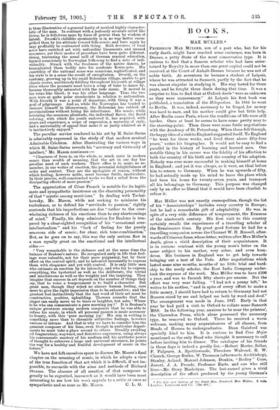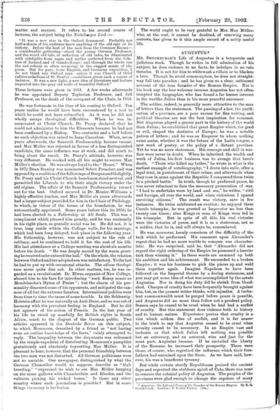BOOKS.
MAX MULLER.*
FRIEDRICH MAX MCLLER, son of a poet who, but for his early death, might have reached some eminence, was born in Dessau, a petty State of the most conservative type. It is curious to find that a famous scholar who had been enter- tained by -Royalty in more than one great capital could not be received at'the Court of Anhalt-Dessau because he was not of noble birth. At seventeen he became a student of Leipsic, where'he was attracted to Sanscrit, partly by the fact that he was almost singular in studying it. His stay lasted for three years, and he fought three duels during that time. It was a surprise to him to find that at Oxford duels "were as unknown as they were unnecessary." At Leipsic his first book was published, a translation of the Hitopadesa. In 1844 he went to Berlin. It was, indeed, necessary to be frugal, for money was hard to earn, and his mother could give but little help. After Berlin came Paris, where the conditions of life were still harder. Once at least he seems to have come pretty near to the starving-point. Then there were some futile negotiations with the Academy of St. Petersburg. When these fell through, the happy idea of a visit to England suggested itself. To England " he went for three weeks, and lived there above fifty-four years," writes his biographer. It would not be easy to find a parallel in the history of learning and learned men. One notable thing in his career was the fidelity of his affection to both the country of his birth and the country of his adoption. Nobody was ever more successful in making himself at home in England ; and yet it was always, as it were, an ideal before him to return to Germany. When he was upwards of fifty, he had actually made up his mind to leave the place which had been his home for twenty-seven years, and transport all his belongings to Germany. This purpose was changed only by an offer so liberal that it would have been churlish to refuse it.
Max Muller was not exactly cosmopolitan, though the list of his " Associateships " includes every country in Europe ; but he had a remarkable gift of adaptability. He was, in spite of a very wide difference of temperament, the Erasmus of -the nineteenth century. His first visit to this country certainly recalls the experiences of a travelling scholar of the Renaissance time. By great good fortune he had for a travelling companion across the Channel W. H. Russell, after- wards of Crimean fame, whose letter, written after Max Miller's death; gives a vivid description of their acquaintance. It is .in curious contrast with the young man's letter on the same subject to his mother, very sober, and even hum- drum. His business in England was to get help towards bringing out a text of the Veda. After negotiations which lasted some nine months, months of no little trial and hard- ship to the needy scholar, the East India Company under- took the expense of the work. Max Muller was to have 2200 a year, and was to furnish fifty sheets per annum. But the effort was very near failing. " I had not a penny left," he writes to his mother, " and in spite of every effort to make a little money, I should have had to return to Germany had not Bunsen stood by me and helped me both by word and deed." The arrangement was made in June, 1847. Early in that *ear he had paid a visit to Oxford to collate some Sanscrit MSS. In the following year, anxious to be near the printers', the 'Clarendon Press, which alone possessed the necessary type, he removed to Oxford. There he received a warm weldome, making many acquaintances of all classes, from Heads of Houses to undergraduates. Dean Gaisford was specially kind to him. It is curious to find Ursa Major mentioned as the only Head who thought it necessary to call before inviting him to dinner. The catalogue of his friends in those days is indeed a goodly list,—Robert Morier, Seller, P. .Palgrave, A. Spottiswoode, Theodore Walrond, R. W. Church, George Butler, W. Thomson (afterwards Archbishop), Stanley, Acland, Manuel Johnson, Donkin, " Bodley " Coxe, Jewett, J. A. Froude, Professor Earle. and one who still lives:—Mr. Story Maskelyne. The last-named gives a vivid description of the effect produced by the young German's The Life and Letters of the Right Hon. Friedrich Maz Maier. 2 vols. London: Low:luaus and Co. 132s. net.1 matter and manner. It refers to his second course of lectures, the subject being the Niebelungen Lied :- " It was a new star in the Oxford firmament. Probably not half-a-dozen of his audience knew anything of the old epic or its history. Before the best of the men from the Common Rooms— a considerable gathering—stood the young German Professor, and the weird old tale, or redaction of old tales, he illuminated with sidelights from sagas and myths gathered from the folk- lore of Iceland and of Gamle-Norge ; and through the whole ran the sad refrain so often recurring in the rugged music of the poem. But for pure, terse English, and luminous exposition, I do not think any Oxford man—unless it was Church of Oriel (afterwardsDean of St. Paul's)—could have given such a course of lectures. It was a new light, a new idea of literature and lecture imported into the grey old walls of beautiful Oxford."
These lectures were given in 1851. A few weeks afterwards he was appointed Deputy Taylorian Professor, and full Professor, on the death of the occupant of the Chair, in 1853.
He was fortunate in the time of his coming to Oxford. Ten years earlier he would have been encountered by a test to which he could not have subscribed. As it was, he did not wholly escape theological difficulties. When he was in- corporated at Christ Church, Dr. Pusey declared that he could not administer to him the Elements because he had not been confirmed by a Bishop. Two centuries and a half before no such objection was raised to Isaac Casaubon. When, seven years afterwards, the Sanscrit Professorship became vacant, and Max Miller was rejected in favour of a less distinguished candidate, the same influence was at work, and did much to bring about the result. Dr. Pusey's attitude, however, was very different. He worked with all his might to secure Max Miller's election. He was always loyal to the " House." When in 1872 Dean Stanley was nominated Select Preacher, and was opposed by a coalition of the followings of Burgon and Golightly, Dr. Pusey and his Christ Church henchmen stood neutral, and permitted the Liberals to win their single victory under the old regime. The affair of the Sanscrit Professorship turned out for the best. Oxford secured in Dr. Mother-Williams a highly effective teacher, and Max Muller six years afterwards had a larger subject provided for him in the Chair of Philology, to which, in virtue of the terms of the foundation, he was automatically appointed. Some years before this (in 1858) he had been elected to a Fellowship at All Souls. This was a compliment which pleased him greatly, and he was eminently in his right place, so genially social was he. He did not, it is true, long reside within the College walls, for his marriage, which had been long delayed, took place in the following year.
His Fellowship, however, was not subject to the rule of celibacy, and he continued to hold it for the rest of his life.
His last attendance at a College meeting was about six months before his death. " He was deeply moved by the warm greet- ing he received as he entered the hall." On the whole, the relation
between Oxford and her adopted son was satisfactory. To the last he had to put up with occasional attacks. The odium theologi- -CUM never quite dies out. In other matters, too, he was re- garded as a revolutionist. Dr. Elwes, organist of New College, abused him to his face for introducing "such flimsy music as
Mendelssohn's Hymn of Praise " ; but the charm of his per- sonality disarmed some of his opponents, and mitigated the ran- cour of all but the extreme fanatics. International politics were from time to time the cause of some trouble. In the Schleswig- Holstein affair be was naturally an Anti-Dane, and so was out of harmony with the prevalent feeling in England. But he did not approve of the action of Prussia. In the last year of his life he stood up manfully for British rights in South
Africa, much to the disgust of the German public. Two articles appeared in the Deutsche Revue on this subject,
to which Mommsen, described by a friend as " not having even an outline knowledge of the facts," vainly attempted to
reply. The inequality between the disputants was redressed by the simple expedient of distributing Mommsen's pamphlet
gratuitously and absolutely boycotting Max Muller. It is pleasant to hear, however, that the personal friendship between the two men was not disturbed. All German politicians were not so amiable. One newspaper, distinguished by what the German Chancellor would, we suppose, describe as " high breeding," " expressed its wish to see Max Muller hanging on the same gallows with Chamberlain and Rhodes, and the vultures picking his wicked bones." Is there any other country where such journalism is possible ? But in some things Germany is barbarian. The world ought to be very grateful to Mrs. Max Millen- who, at the cost, it cannot be doubted, of renewing many sorrows, has given to it this ample record of a nobly useful life.











































 Previous page
Previous page